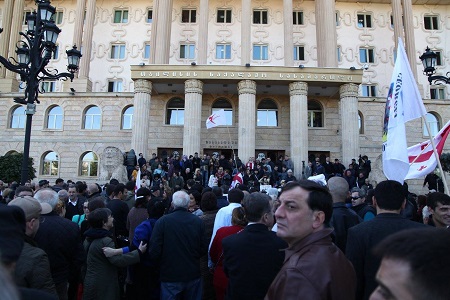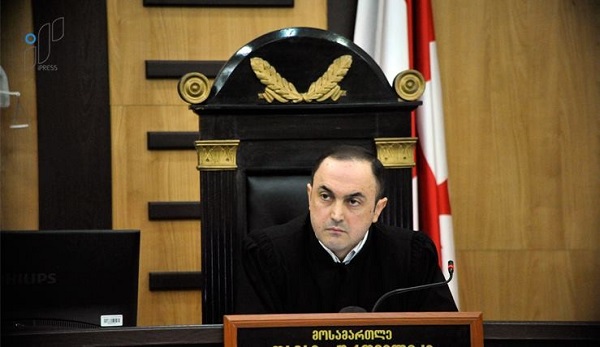High Council of Justice claims Rustavi 2 Judge was pressured by local, foreign forces

A handful of members of the High Council of Justice of Georgia claim the judge leading the notorious Rustavi 2 ownership court case was repeatedly insulted, criticized and under serious pressure by local and foreign officials and figureheads during his time in court.
Five non-judge members of the 15-member High Council of Justice of Georgia, a body responsible for independence of judiciary, released the poignant statement today that claimed Tbilisi City Court Judge Tamaz Urtmelidze faced undue pressure while presiding over the Rustavi 2 case.
The members said there were intense attacks on the decision of the Tbilisi City Court, repeated insults against the judge, inept criticisms of the Court decision and intentional twisting of facts by local and foreign bodies regarding the Rustavi 2 ownership dispute case.
The statement comes days after Judge Urtmelidze ruled that former shareholder of the private broadcaster, Qibar Khalvashi, must regain 100 percent of his shares of the media outlet. The verdict was in line with Khalvashi’s claim that he was he was illegally deprived of his property under the previous state leadership.
However, the change of ownership did not immediately take place as the Constitutional Court banned such action until the case covered all legal instances.

Judge Tamaz Urtmelidze. Photo by Ipress.
Instead, based on an appeal by Khalvashi, Judge Urtmelidze appointed two temporary managers to Rustavi 2, following the leak of audio recordings on the internet that revealed current Rustavi 2 managers were connected with former state leaders and had discussed staging an alleged coup in Georgia using the Rustavi 2 case as the basis for the action.
The ownership dispute case generated significant interest within Georgia and abroad, with many sides commenting on the issue. In Georgia local opposition politicians, non-governmental organisations (NGOs) and diplomatic corps said they were "concerned over the Rustavi 2 developments”.
The intense attacks on the decision of the Court, the repeated insults against the judge, the often inept criticisms of the court decision and sometimes intentional twisting of facts, as expressed by different politicians, public servants, senior officials, NGOs, public figures, Ambassadors accredited in Georgia and others, as well as other uncalled-for actions, significantly undermine the independence of the judiciary, other fundamental principles, and the sustainability of state institutions,” the members of the High Council of Justice stated.
Their statement emphasized that property rights and freedom of expression were equally important pillars of democracy, which must be ensured by equal protection and by striking a balance between individual and public interests.
Which actually is the job of the independent judiciary – not at the expense of either of these values. The diverse and intense moral pressure on Judge Urtmelidze undermines the effectiveness of the judiciary on the whole, which must be cherished and protected by society,” the statement read.
The High Council of Justice members appealed to all sides to abstain from making statements or taking action that contributed to discrediting and politicising the judiciary.
High Council of Justice meeting
The release of the statement was preceded by a meeting of the High Council of Justice, chaired by the head of the Supreme Court of Georgia Nino Gvenetadze. The Council consisted of eight judge members and five non-judge members selected from the civil and academic fields.
The meeting was initiated by Gvenetadze and Judge Urtmelidze was also invited however he declined to attend. Before the meeting Gvenetadze said she had several questions to ask Urtmelidze on why the City Court’s last solution over temporary managers had not been timely released and whether or not he had really been pressured during the court case.
Urtmelidze declined to attend the meeting, as he believed his presence could have put the Court’s independence into question. He also believed no judge was obliged to make a report over his verdict.
This approach was shared by judge Council member Levan Musuridze, who said any judge was free to deliver a verdict and if any party was dissatisfied with the verdict, any side could appeal the decision to a higher court of law.
The case – as it happened
- On August 7, 2015 former owner of Rustavi 2 Qibar Khalvashi initiated a lawsuit against the current owners of the public broadcaster, claiming he was illegally deprived of his company shares under the United National Movement (UNM) government.
- On October 30 a Ukrainian webpage released audio recordings where Georgia’s ex-president Mikheil Saakashvili spoke with UNM leaders and Rustavi 2 director Nika Gvaramia over an alleged coup in Georgia, using the Rustavi 2 case as grounds for action.
- On November 2 the Constitutional Court of Georgia ruled no legal enforcements could begin regarding the Rustavi 2 case before the case covered all legal instances in Georgia.
- On November 3 Tbilisi City Court delivered its verdict – 100 percent of his shares would be returned to former owner Khalvashi.
- On November 6 a Tbilisi City Court judge appointed two temporary managers to Rustavi 2. The reason for this was because the current managers, Gvaramia among them, had connections with previous state leadership that might have caused a threat to company property.
- On November 7 , in order to ensure the media outlet remained functioning as normal, temporary managers Davit Dvali and Revaz Sakevarishvili offered current owners of the broadcaster to name "any” person to whom interim managers would grant power of attorney with full authority.
- On November 7 United States Embassy to Georgia, the European Union Delegation to Georgia and heads of the diplomatic Mission of the EU Member States in Georgia said they were concerned by the appointment of temporary leaders to Rustavi 2.
- On November 8 Rustavi 2 leadership turned down the offer, saying they did not intend to cooperate with "Government appointed censors”.
See more information and a report on the controversial ownership history of Rustavi 2. The broadcaster changed leadership 20 times in several years. Read more here.
The Government’s reaction
The Georgian Government publically said it did not interfere in the Rustavi 2 ownership dispute. The Government said it was a legal matter not a political matter.
Georgia’s Foreign Minister Giorgi Kvirikashvili stated it was not positive one side of the case refused to negotiate for the benefit of the broadcaster.
The Minister proposed the idea to create a professional, independent council in the TV channel that would ensure editorial independence before the process was completed.
Meanwhile Minister of Regional Development and Infrastructure Nodar Javakhishvili said he understood statements by the international community were unclear, as no one had the right to force a person not to appeal to a court and fight for their property.
 Tweet
Tweet  Share
Share